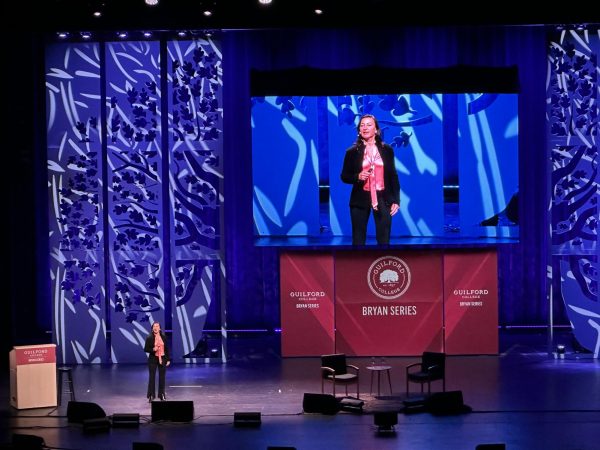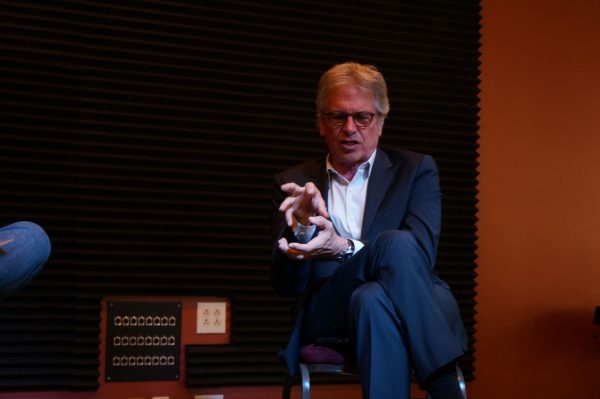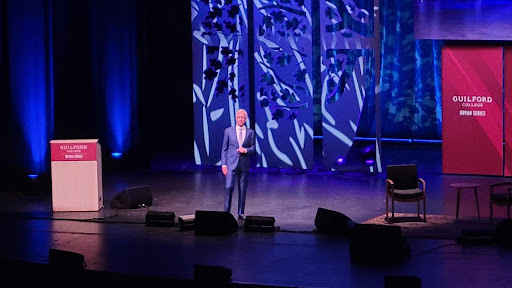Alum advocates for change
“Guilford has achieved quite a lot in the two and a half years I’ve been here,” wrote journalist and disability rights activist Bryan Dooley ’13 in a 2012 article in The Guilfordian. “But we all have a long way to go to ensure an accessible environment for every student, faculty, staff and visitor.”
Accessibility, among many other topics, has been at the forefront of Dooley’s work since graduation.
On Oct. 25, Dooley presented a Center for Principled Problem Solving ChangeMaker Chat titled “Actions speak louder than flags: why I think it’s important to demonstrate our values, rather than bragging about them.” His chat revolved around his observations, experiences and opinions as a disability rights activist and freelance writer.
“Bryan has recently finished writing for the Camel City Dis- patch, has a twice-monthly blog on The Huffington Post called ‘Observations from Below’ and he’s currently serving on the Disability Rights for North Carolina, a nonprofit organization in the statewide NC Council on Developmental Disabilities,” said Mark Justad, director of the Center for Principled Problem Solving and adjunct professor of religious studies.
“Bryan was in our third class of CPPS Scholars. Students are like children: you’re not supposed to have favorites. But it’s hard not to have a favorite. Bryan and I connected because we share a very dry sense of humor. People with dry senses of humor recognize each other very quickly because it’s nice to have your jokes received.”
Dooley began his presentation with a message that would form the base of his talk and his work ethic. He used a text-to-speech program on his computer to read his speech, as a result of his speech impediment.
“You can only say you have certain principles if you demon- strate them in your everyday life,” said Dooley.
“As an advocate, I interact with a lot of politics and politicians. It would be very easy for me to allow my personal viewpoints on politics to skew my advocacy. But my commitment to the values mentioned in the (Americans with Disabilities Act) and my knowledge of the history behind the laws prevent me from being biased in my advocacy.”
Part of this objectivity is acknowledging that both major political parties have contributed to furthering disability rights one way or another but that there is still a long way ahead.
“One interesting fact is that almost every major piece of disability legislation has been signed by a Republican president with a lot of cooperation from the other side of the aisle,” said Dooley. “We need to find a way out of this hyperpartisan environment that we find ourselves in.
“Maybe Donald Trump opened the door to more disability rights protections when he mocked the journalist with a disability. Democrats did a lot of work with their response during their convention. This year is the first time in a long time that disability is a campaign issue.”
Some of the activist’s current work focuses on getting disability rights awareness into the education system of North Carolina.
However, the lack of government funding allocated for this purpose has posed a challenge for this effort.
“North Carolina has a bill called (House) Bill 753 that man- dates every public school to teach, in the month of October, disability rights somehow, some way,” said David Owen, Dooley’s assistant. “We emailed (the administrations of one) North Carolina county school system – middle, elementary, high schools – and got no response.”
Dooley finished his talk with a personal analysis of the values stated in the ADA: equality of opportunity, full participation, independent living and economic self-sufficiency.
“People with disabilities are still less likely to have full, paying jobs compared to ordinary individuals,” said Dooley. “The majority of the work I do is pro-bono in the truest sense. I don’t receive any economic gain, but I feel compelled to sit on all these boards and try to make a difference as long as I can. It would be nice if my work could be recognized in some form of compensation.”
Dooley is not alone. Many people around the world share his frustrations with inaccessibility, inequality and lack of involvement.
“People who are disabled go through the world having to have modifications made to them,” said first-year Raina Baier. “The world should alter its view of that and try to make modifications for people who are disabled instead.”








